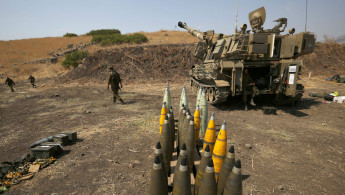Israeli army shells Lebanon after Hezbollah missile attack
Israel said it was returning fire on Sunday after anti-tank missiles were launched at its territory from Lebanon, raising fears of a serious escalation with Hezbollah after a week of rising tensions.
"A number of anti-tank missiles were fired from Lebanon towards an (Israeli military) base and military vehicles," an Israeli army statement said.
"A number of hits have been confirmed. (Israel's military) is responding with fire towards the sources of fire and targets in southern Lebanon.”
Hezbollah said the unit that carried out the attack on Israel was named after two operatives who were killed in an Israeli airstrike on Syria on August 24. It said one of its units had destroyed an Israeli military vehicle and wounded the people inside.
Hezbollah fighters "destroyed a military vehicle on the road to the Avivim barracks (in northern Israel), killing and wounding those inside," the Shia group said in a statement.
Straight after the attack, Israeli artillery fired shells on the Lebanese side of the border including the village of Maroun el-Ras triggering fires.
After the initial reports of fire from Lebanon, a military spokesman called on Israelis living within four kilometres of the Lebanese border to remain at home and prepare shelters.
Tensions have risen in the last week between Israel and its enemy Hezbollah, the Lebanese Shiite movement backed by Iran.
Hezbollah chief Hassan Nasrallah said Saturday the group's response to an alleged Israeli drone attack on the group's Beirut stronghold had been "decided".
The pre-dawn August 25 attack involved two drones -- one exploded and caused damage to a Hezbollah-run media centre and another crashed without detonating due to technical failure.
Israel has not claimed responsibility for the incident.
The attack in Lebanon came just hours after Israel launched strikes in neighbouring Syria to prevent what it said was an impending Iranian drone attack.
Israel and Hezbollah fought a month-long war in 2006 that ended in a stalemate. Despite their deep hostility, they have largely refrained from direct fighting for the past 13 years.





 Follow the Middle East's top stories in English at The New Arab on Google News
Follow the Middle East's top stories in English at The New Arab on Google News


![22 Arab countries at COP29 have rejected the targeting of fossil fuels [Getty]](/sites/default/files/styles/image_330x185/public/2024-11/GettyImages-2184289638.jpg?h=199d8c1f&itok=ptHl5bec)